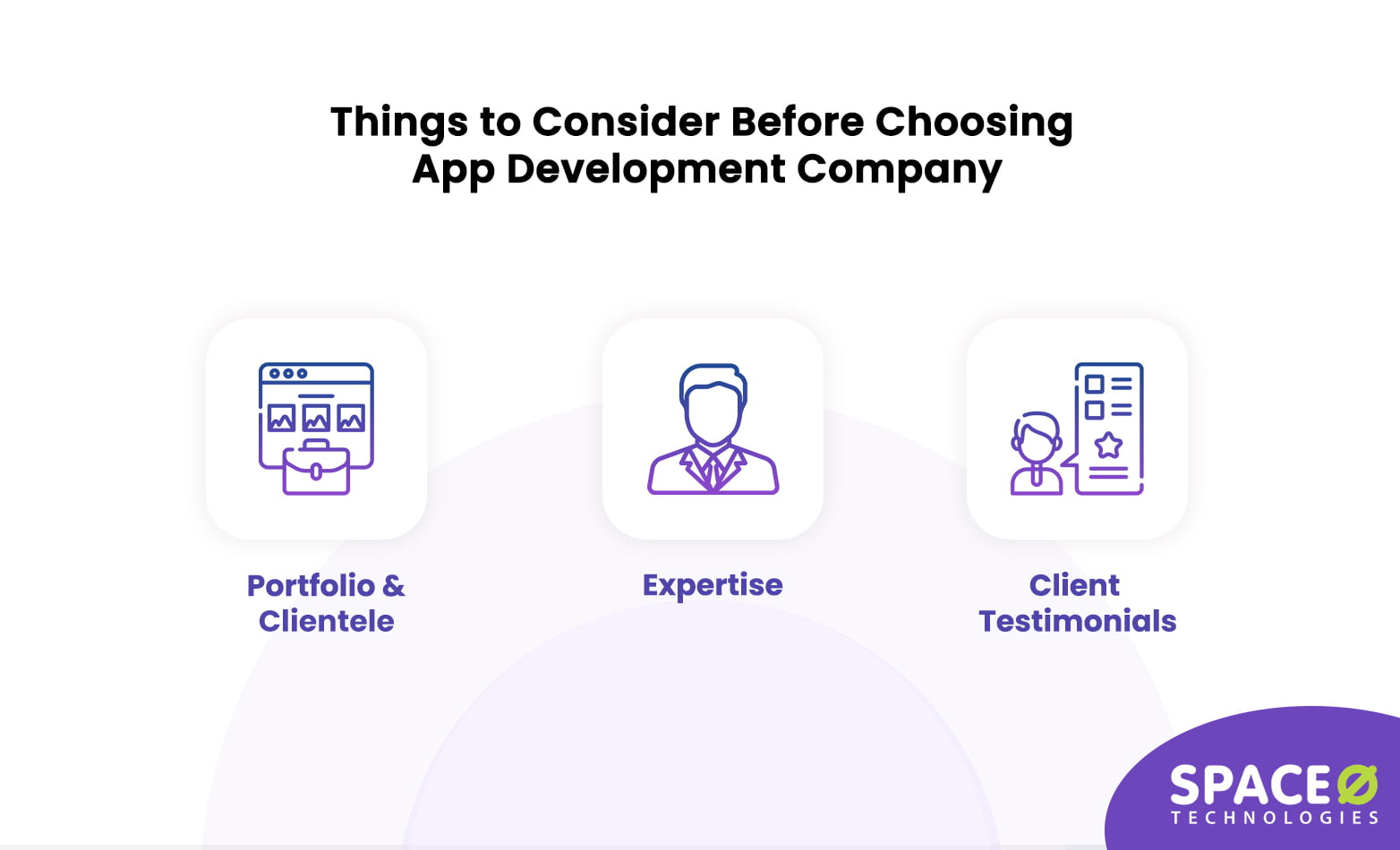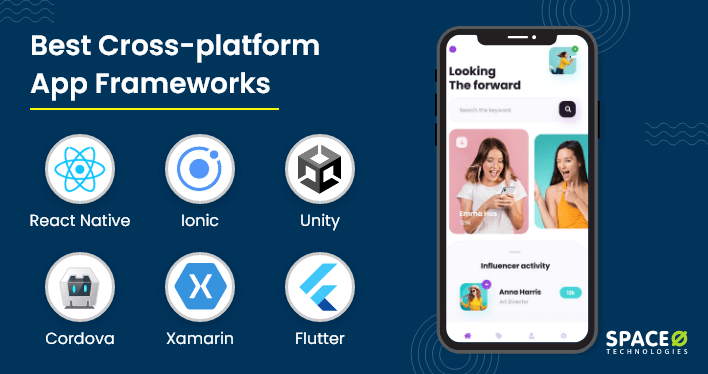Do you want to reach a wider audience to enhance your business?
As an experienced cross-platform app development company we can help you achieve this by developing apps that can run on multiple platforms, allowing you to get to market faster.
Being the best mobile app development service provider, we have discussed with our cross-platform app developers and written a complete guide highlighting cross-platform app frameworks and the benefits of cross-platform apps. This will help you launch your app quickly in the market. Let’s dive in.
Table of Contents
What is a Cross-platform App Framework?
Cross-platform mobile apps have the ability to run on various mobile platforms, such as iOS, Android, and Windows. Therefore, using a cross platform app development framework you do not require separate coding to build an app for each different platform. Also, you should know the complete difference between Native vs Cross Platform app development as well. Choosing the right app development type directly affects your cost as well.
Also, as the cross-platform is compatible with multiple platforms, it is easy to reach a broader audience.
With all the benefits, it is one of the most popular app development methods for startups and enterprises who are looking to resolve mobile application development challenges efficiently.
Let’s dive in to discover the best cross-platform app frameworks that are used extensively by app developers.
11 Best Frameworks for Developing Cross-Platform Mobile Apps
In this section, we will discuss the top cross-platform app development frameworks that will help you build robust cross-platform apps for your startup or enterprise business.
A report by Statista suggests that these are the top cross-platform frameworks that are used by developers worldwide.
- React Native
- Flutter
- Ionic
- Cordova
- Unity
- Xamarin
So before we move ahead to discuss these frameworks, let’s have a quick comparison of all these cross-platform app development frameworks.
| Framework | Developer | Release Year | Repository | Written In | Popular Apps |
|---|---|---|---|---|---|
| React Native | 2015 | ReactNative Github |
|
| |
| Flutter | 2017 | Flutter Github |
|
| |
| Ionic | Drifty | 2013 | Ionic Github |
|
|
| Cordova | Nitobi | 2009 | Cordova Github |
|
|
| Unity | Unity Technologies | 2005 | Unity Github |
|
|
| Xamarin | Microsoft | 2011 | Xamarin Github |
|
|
| Qt | The Qt Company | 1995 | Qt Github |
|
|
| Sencha Ext JS | Sencha, Inc. | 2007 | Sencha Github |
|
|
| NativeScript | nStudio | 2015 | NativeScript Github |
|
|
| Solar2D | Corona Labs Inc. | 2009 | Solar2D Github |
|
|
| Node.js | OpenJS Foundation | 2009 | Node.js Github |
|
|
Want to Build a Cross-platform App?
Space-O is a leading cross-platform mobile app development company that has experience designing and developing more than 4400 mobile apps for leading startups and enterprises.

Now, let’s discuss all these frameworks in detail.
React Native
Ever had a question like, is React Native good for mobile app development? It is an open-source, cross-platform framework developed by Facebook to create cross-platform iOS and Android applications. The application logic runs in JavaScript but still offers 100% native UI. So with React Native, you easily avoid many compromises generally associated with HTML5-based UI.
With React Native, you easily build a cross-platform app using the same UI components and codebase. You can also use React Native in your existing Android and iOS apps or use it to create a completely new cross-platform app from scratch.
Top Advantages of Using React Native for Cross Platform App Development
- Almost 90% of the code is reused between the iOS and Android platforms
- React Native performs like native apps as it leverages graphics processing units
- You get pre-developed UI components with React Native
- Get live and hot reloading feature to preserve the local state of the code on refresh
Flutter
It is the best cross-platform app framework that you can use to develop apps for Android and iOS without having to write different codebases. In fact, with the same codebase, you can build web apps for browsers, Windows, and Linux.
Flutter is very famous in the market. Currently, it is used by Google for the modules of the Google Assistant and the UI of the Google Home hub.
Besides Google, big eCommerce giants like eBay and Alibaba Group also use Flutter for a uniform look and feel in mobile and web apps.
Top Advantages of Using Flutter for Cross Platform App Development
- Allows to use of the same UI and business logic for all platforms
- Give similar native app performance
- Offer custom animated UI for any complex app
- Easy to do fast testing with the hot reload feature
Ionic
Ionic is an open-source SDK that allows developers to build high-quality cross-platform apps that show native experiences. It comes with a lot of mobile-optimized UI components and gestures that help you build robust cross-platform applications.
Ionic lets you develop cross-platform apps using modern web development technologies, such as CSS and HTML, and then the apps are distributed through app stores for installation.
Top Advantages of Using Ionic for Cross Platform App Development
- Easy to customize the look and feel of the app with only HTML and CSS modifications
- Get a lot of components and plugins with Ionic, including front-end building blocks, UI components, and app icons
- UI components are used to construct a graphic UI and also can be customized
Cordova
Formerly known as PhoneGap, Apache Cordova enables app developers to perform hybrid mobile app development using standard technologies, such as CSS3, HTML5, and JavaScript. You use Cordova, which wraps your HTML/JavaScript app into a native container to access the device’s functions.
With this, you have to write only one set of code that you can easily target on each device type and publish your cross-platform app on respective platforms.
Top Advantages of Using Cordova for Cross Platform App Development
- It is easy to target any platform that you want for your app
- Apache Cordova plugins help developers to extend more features to an app
- Cost-effective technology to build a high-quality app with advanced features
- Can use the properties of the native resources to build an app
Unity
It is a multi-platform mobile development tool that is used to build cross-platform gaming apps. As of now, it is one of the most popular game engines for building apps for Android and iOS platforms because of its streamlined interface and workflow.
However, it is not only limited to game development. You can also use Unity for animation, architectural visualization, and the previsualization of a film. In addition, Unity makes the development process easier by using an intuitive and rapid user interface.
With Unity, you can drag and drop elements, such as adding an image or button or using a custom font size. In addition, as you will not require a background in XML to build UIs, you need less coding while working with Unity.
Top Advantages of Using Unity Cross Platform App Development
- Best graphics to optimize the gaming experience
- Great for rendering 2D and 3D scenes in the cross-platform apps
- Offers built-in analytics that help you with crucial insights into your game
- Has drag and drop settings that allow you to build an app without having to write code
Xamarin
Xamarin has the tools and libraries that help you design a uniform UI across platforms or build apps for Android, iOS, and Windows. Also, leveraging the platform-specific hardware, Xamarin can offer you the best native performance.
With Xamarin, you share more than 75% of the code to build an app, which helps you save time and resources, as this also follows the “write once, run anywhere” approach. You can also use your favorite frameworks, tools, and libraries and get access to native APIs and 2D graphics.
Top Advantages of Using Xamarin Cross Platform App Development
- Easy to use and takes less time to build cross-platform apps
- As you share more than 75% of the code, the app development process becomes faster
- Has direct access to Native APIs to get the native user experience
- Offers APIs and plugins to build cross-platform apps, so there is no hardware compatibility issue
Qt
This cross-platform framework can be used to create apps for macOS, Windows, Linux, Android, and embedded systems. It is written in C++ and aids in the development, testing, and deployment of GUIs and apps. This framework also supports Python, Ruby, and Java binding.
VLC Media Player and FileZilla are two examples of Qt-built applications.
Top Advantages of Using Qt Cross Platform App Development
- Qt has a quick development cycle, hot reload, an integrated debugger, and many other features.
- A large collection of pre-designed components, such as buttons, menus, and form elements, that can be used to create GUIs and other types of applications.
- It includes testing support, allowing you to easily write and run automated tests for your applications.
- It has a large and active developer community and provides a wide range of tools and resources, such as documentation, tutorials, to assist developers.
Sencha Ext JS
Sencha Ext JS is a cross-platform app development framework that allows you to create HTML5 applications for desktop computers, tablets, and mobile phones. It makes use of the Ext JS JavaScript library and offers a variety of tools and resources for developing, testing, and deploying mobile applications. It is particularly useful for creating data-intensive business applications and real-time web applications.
Top Advantages of Using Sencha Ext JS Cross Platform App Development
- The framework includes a comprehensive set of features and tools for developing web-based applications, including data management, visualisation, and analysis capabilities.
- Sencha Ext JS has a large and active developer community that provides a wealth of resources and documentation to help users get started with the framework.
NativeScript
NativeScript is an open-source cross-platform framework for developing apps with a native look and feel. Which means an app build with NativeScript will perform like a native app build for iOS and Android. It uses JavaScript to interact with the same native APIs that one uses when developing apps on platforms like Xcode or Android Studio. It has a very large and active developer community which makes it easy to build apps faster with code reusability.
Top Advantages of Using NativeScript Cross Platform App Development
- NativeScript supports the development of iOS and Android mobile apps with Angular, allowing developers to reuse code and save time and money.
- NativeScript enables developers to create mobile apps by utilizing Native APIs. As a result, it is easier for them to implement various device-specific functionalities, resulting in improved performance even when developing complex apps.
- It supports the use of many popular JavaScript libraries which allows developers to build quickly without dedicating time to learn new libraries.
Solar2D (previously Corona SDK)
Solar2D, formerly known as Corona SDK, is an open-source software development kit for developing mobile apps. It is written in the Lua programming language and also makes use of C++ and OpenGL. It can create a wide range of apps with a single codebase, but developers prefer it for building graphically intensive apps such as mobile games.
Top Advantages of Using Solar2D Cross Platform App Development
- The Solar2D framework is written Lua programming language which is very easy to learn.
- A very large and active community helps developers find resources and solutions to common development issues.
- It supports building apps on multiple platforms like iOS, Android, Windows, mac, Linux, Kindle and many more with a single codebase.
Node.js
Node.js is a free and open-source JavaScript runtime environment that runs on Windows, Linux, MacOS, and others. It is mainly used for server-side development and script development. However, Node.js is also used for cross-platform app development, and JavaScript is used for both client and server side applications. For example, React Native and Apache Cordova can be used to create mobile apps that can run on multiple platforms such as iOS, Android, and Windows. Node.js can also be used to create cross-platform desktop apps using technologies such as Electron.
So, Node.js is not a framework, it is a JavaScript runtime environment which is frequently used with popular frameworks to build web and mobile applications.
Top Advantages of Using Node.js Cross Platform App Development
- When developing cross-platform applications, it gives developers a large pool of frameworks to choose from.
- It is simple to learn because it is based on the “JavaScript Everywhere” principle. And JavaScript is one of the most popular used programming languages.
- Apps built with Node.js are fast and simple to scale. It also has a large and active community for support and learning.
Want to Validate Your Cross-platform App Development Idea?
Talk to our app development consultants, who will discuss your app idea and help you optimize it according to your requirements.
What are the Advantages of Cross-platform App Development Frameworks?
In this section, we are going to discuss the pros of cross-platform apps in detail, so you know how cross-platform mobile apps help your enterprise business grow.
Wide Reach to Target Audience
Building a cross-platform app means you can launch it on various mobile app development platforms, including the web. As Android and iOS hold a majority of the market share for operating systems, it is essential to build an app that targets both operating systems.

Source: Statista
So by developing a single app, you can target several platforms, such as iOS and Android. This helps you expand the reach of your products or services and increase revenue by making them available for both Android and iOS users.
Lower App Development Costs
The cross-platform app is developed based on the concept of ‘write once, run everywhere’. Additionally, when it comes to native app development for a specific platform, it is an expensive and difficult task to achieve. Therefore, it generally increases the cost of app development.
However, this is not the case with cross-platform applications. This means you easily cut their development costs in half by developing cross-platform apps that run on various platforms. Hence, cross-platform app development is a more cost-effective approach to developing an app.
Quick App Development Process
Building a cross-platform app means you are able to launch the application in the market sooner. In addition, a similar codebase helps you to lower your efforts by 50 to 80%, helping you to be faster in the market.
Suppose you are building an app for an Android device. Then you need to program in Java along with mastering mobile app development tools, such as Android SDK, Android NDK, and IntelliJ IDEA. This rule also applies to the iOS platform, where you need to program with Swift and other iOS app development software.
But when you are developing a cross-platform app, you can use the same code for various platforms by using a “write once, use everywhere” approach. Therefore, it is possible for mobile app developers to deliver cross-platform applications within the estimated app development timeline.
Reusable App Codes
If you choose to build a cross-platform app, then you can use a similar code multiple times. This helps developers to save time as they can choose to avoid writing new codes for every platform.
This saves time to develop an app as well as your resources by eliminating the repetition in the task of creating codes. Hence, with the cross-platform app, you can reuse the same code multiple times and save your app development time.
Integration to Clouds
The best part about developing cross-platform applications is that you are able to use a variety of plugins integrated with the cloud settings, as cross-platform apps are compatible with plugins.
As you will be building a cross-platform app, you can infuse single source code with different plugins and extensions to improve the quality and performance of the application.
Easy Maintenance and Deployment
As a cross-platform app runs over several platforms, you only need to maintain a single application. This brings the benefit of maintaining and deploying code after the changes are made. Even, you can hire dedicated developer in case if you have complex mobile app to maintain.
Whatever change you make will automatically be synced over all platforms and devices, helping you save time and money and maintain your app efficiently.
Suppose you find a bug or defect in the codebase. Now, you are only required to fix it once, and it will get changed to all other places where the same code is used. This is how it is easy to maintain your cross-platform application by saving your time and money.
We have discussed some of the advantages of a cross-platform app. However, just like every other app development approach, it also has its cons. In the next section, we are going to discuss the cons of a cross-platform app.
After learning almost everything about cross-platform mobile app development, if you want to know where to find developers or what to look for before hiring a company, check the below FAQs.
FAQ About Cross-platform App Development
Where to find cross-platform mobile app developers?
- Space-O Technologies
- Toptal
- Clutch
- Upwork
Which factors to check before hiring a cross-platform app development company?
Here are a few factors to check if you are hiring a reliable app development agency to build a cross-platform app.

Apart from the above factors, you can also look for the following points.
- Global presence and development team size
- App design and development standards
- NDA agreements
What are examples of cross-platform apps?
- Evernote
Build Your Own Cross-platform App
Through this guide, you learned about cross-platform app frameworks and libraries. If you want to build and launch your app quickly in the market, leverage the benefits of hybrid mobile app development. In case you face any challenges while validating your app idea or building a cross-platform app, get in touch with our experienced mobile app developers. We have experience working with more than 4400 clients across the globe to deliver top apps like Glovo, which has received a total funding amount of $1.2B within a few years.
Get in touch with us through the Contact Us page, and we will get back to you within 24 hours.




